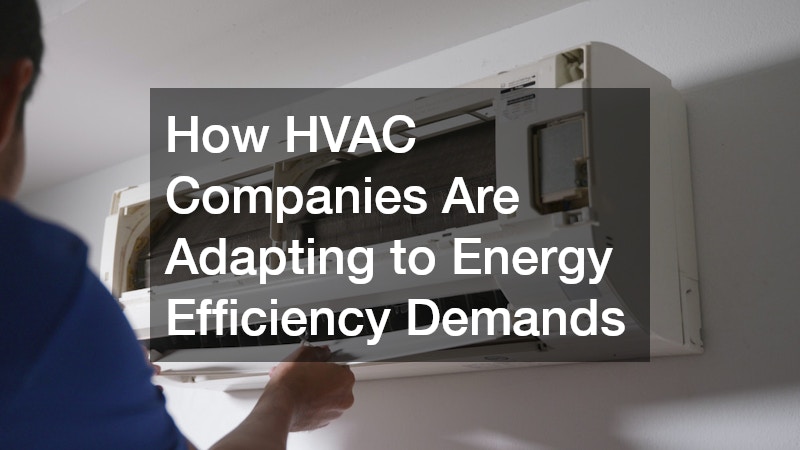
This article explores the evolving landscape of energy efficiency within the HVAC industry and how companies are adapting to meet growing consumer and regulatory demands.
Energy efficiency standards for HVAC systems have changed dramatically in recent years. These standards, governed by various regulatory bodies, typically revolve around ratings such as SEER (Seasonal Energy Efficiency Ratio), which gauges the efficiency of air conditioning systems. Higher SEER ratings indicate more efficient equipment, prompting manufacturers to innovate continuously to enhance their product offerings.
Regional regulations further complicate the landscape as they often enforce stricter guidelines in specific areas. For instance, some states may require HVAC systems to meet certain efficiency thresholds that exceed federal standards.
Video Source
This dynamic pushes HVAC companies to adapt their designs and installations to comply with varying requirements across the country.
In addition to these regulatory frameworks, consumer awareness regarding energy efficiency has grown significantly. Homeowners are increasingly seeking HVAC systems that not only provide comfort but also reduce energy consumption and utility bills. Consequently, HVAC companies must align their products and installation practices with these changing expectations to remain competitive in the market.
The integration of smart technology in HVAC systems represents a significant advancement in promoting energy efficiency. One of the focal points has been the use of Internet of Things (IoT) devices that allow for enhanced control and monitoring of HVAC performance. These devices can optimize energy use by adjusting settings based on real-time data, adapting to the needs of households or commercial buildings instantly.
Smart thermostats play a crucial role in this adaptation, offering features such as learning algorithms that understand user habits and preferences. By analyzing this data, these devices can suggest optimal settings that reduce energy waste while maintaining comfort. Furthermore, homeowners can gain access to their HVAC systems remotely, providing an additional layer of convenience that encourages efficient usage.
Energy monitoring systems represent another innovative addition to HVAC technology, allowing users to track energy usage and make informed decisions. By providing insights into when and how energy is consumed, HVAC companies can better educate consumers on potential savings and efficient practices. As these technologies become more prevalent, their impact on overall HVAC efficiency is expected to grow, highlighting the industry's commitment to embracing innovations that cater to energy efficiency demands.
Renewable energy sources are playing an increasingly vital role in the HVAC industry's adaptation to energy efficiency demands. Solar energy, for example, can be harnessed to power HVAC systems, dramatically lowering reliance on conventional energy sources. This shift not only reduces operating costs but also aligns with a broader push toward sustainable practices in residential and commercial spaces.
Geothermal systems are another area where HVAC companies are exploring renewable resources. Utilizing the constant temperature of the earth, these systems can provide heating and cooling with minimal energy expenditure. As the technology matures, more HVAC companies are looking to integrate geothermal solutions into their offerings, presenting clients with cost-effective and environmentally friendly options.
The implementation of these renewable technologies is not without challenges; however, many HVAC companies are actively seeking partnerships and resources to enhance their expertise in this field. The combination of renewable energy with traditional HVAC systems represents a paradigm shift in how energy efficiency is approached, leading to a future where HVAC companies can confidently promote both high performance and sustainability.
Education plays a crucial role in helping consumers understand the importance of energy efficiency in HVAC systems. Many HVAC companies are implementing outreach programs to inform clients about available energy-efficient options and their associated benefits. This includes workshops, webinars, and printed materials that highlight how consumers can save money and conserve energy by choosing the right systems.
In addition to general education, HVAC companies are focusing on the importance of regular maintenance for optimal system performance. By emphasizing timely maintenance checks and tune-ups, these companies are helping homeowners realize that energy efficiency is not solely about the initial installation but also about ongoing care. This aspect often leads to improved energy savings over the lifespan of the HVAC systems.
Simplifying the technology behind energy-efficient HVAC options is another strategy being employed. By using easy-to-understand language and concrete examples, HVAC companies are helping consumers overcome apprehensions about new technologies. As educating consumers remains a priority, the HVAC industry is not only paving the way for energy-conscious decisions but also fostering a culture of awareness and responsibility surrounding energy use.
To summarize, HVAC companies are taking significant steps toward adaptation in response to energy efficiency demands, ensuring they remain competitive and environmentally responsible in an evolving marketplace.
